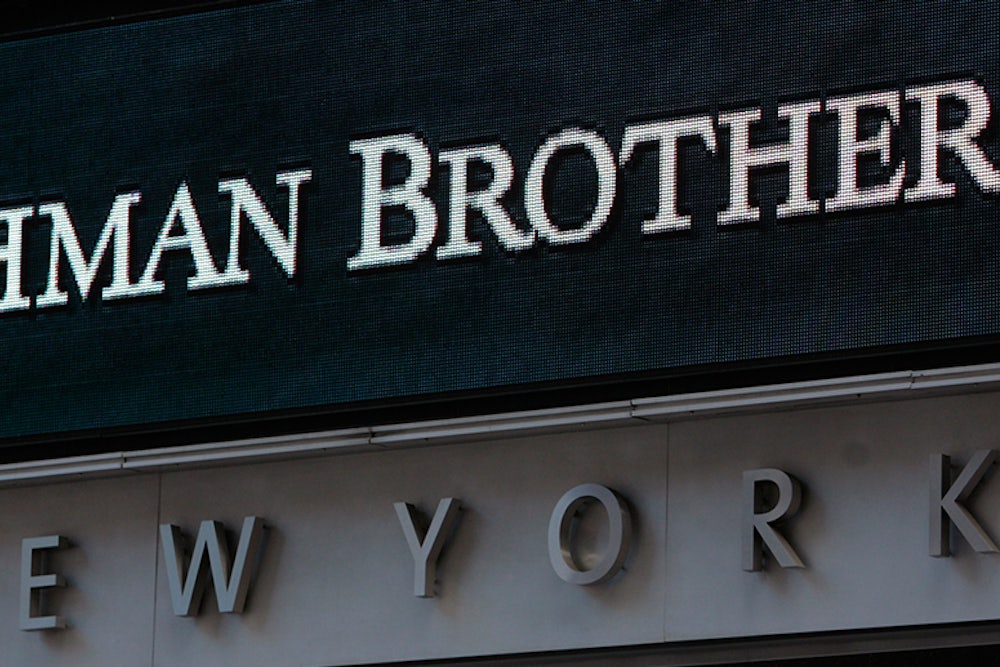It's hard to say when, exactly, the demise of Lehman Brothers became inevitable. But it likely came around noon on Saturday. That's when Morgan Stanley CEO John Mack, meeting with federal and Wall Street big wigs at the New York Federal Reserve, turned to his colleagues and asked that if they were going to bail out Lehman this time, "where does it end?" It was in no one's interest to have the government bailing out every tottering investment bank, he said, and no one in the room disagreed. Though the talks went on, Lehman was dead.
Should the feds have underwritten a Lehman bailout? Those in favor, like The New York Times' Paul Krugman, say the government is taking too big a risk by refusing to help. Without government assurance, they argue, the already delicate balance of financial debt arrangements propping up much of the sector could unravel as investors flee. Bailouts have worked in the past; the 1998 rescue of Long Term Capital Management was almost certainly necessary in the short term, because a failure might have unraveled the growth of the hedge fund industry then still in its relative infancy (whether that was a good thing in the long term is a different question).
Those opposed to a bailout, like me, did so mainly out of fears of creating a moral hazard: that bankers would come to expect the government to help them out, and thus take more risks than they would otherwise. But propping up Lehman would also mean propping up a status quo that both bankers and regulators agree is outdated. The regulatory structure that was established in the 1930s--the Securities and Exchange Commission, the Federal Deposit Insurance Corporation--is simply incapable of overseeing a 21st-century financial system that knows no borders, evolves at near-light speed, and operates according to rules few people understand--even the ones running the show. (As Citigroup Chair Robert Rubin told NewsHour's Judy Woodruff earlier this year, "Most people who deal with these instruments [collateral debt obligations] probably do not fully understand all the risks that are embedded in those instruments that can materialize under unusual circumstances.")
It is in everyone's interest, then, for the government to be as forward-looking as possible, as soon as possible. Allowing Lehman to fail is part of such vision. It announces that, despite having rescued Bear Stearns, Fannie Mae, and Freddie Mac, there are limits to the government's largesse. While the details need to be filled in--why save one but not the other?--such posturing sets Washington up nicely for the really hard work ahead, namely establishing new regulatory structures and rules for the 21st-century financial sector. Having withheld assistance, it can dictate new rules from a position of strength, acting as the tough-talking Dutch uncle, rather than the doting grandmother.
Defining what that new structure will include is above my pay grade (ominously, the question seems to be above everyone's pay grade at the moment). But it could involve a reinstitution of the Glass-Stegall Act's separation of commercial and investment banking, the removal of which, critics say, has exposed average investors to unrealized risk and created unnecessary conflicts of interest among banks; it would almost certainly include rules on the amount of debt firms can take on; and, as both presidential candidates have made clear, a restructuring of the messy regulatory universe is also essential to reform. That last conversation began after the Bear Stearns rescue in March, and it should continue through to the next administration.
While neither candidate is likely to resist the urge to restock the White House Cabinet, both Obama and McCain could also give the market a strong jolt of confidence by at least provisionally committing to keep Henry Paulson on as Treasury Secretary. George Bush has made a lot of bad decisions, but one of his best was replacing the hapless John Snow with the former CEO of Goldman Sachs--one of the few firms not teetering on the edge of dissolution. Though he faltered in his first stab at regulatory reform this spring, he has done an admirable job since then establishing himself as an independent, intelligent player, someone who can speak honestly and clearly with the banking industry, and come away with their confidence even as he draws the line on bailouts. While observers can rightly second guess a lot of his moves, it would be hard to think of someone better in the same spot. Given that the current turmoil isn't going to right itself by January, a promise of federal continuity, at least in the secretary's office, would do a lot to settle Wall Street jitters.
